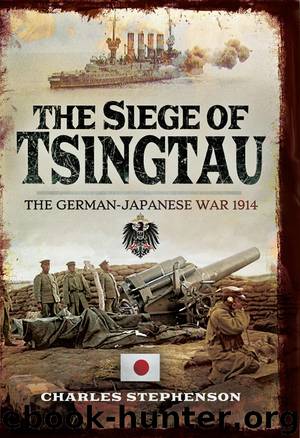The Siege of Tsingtau: The German-Japanese War 1914 by Charles Stephenson

Author:Charles Stephenson [Stephenson, Charles]
Language: eng
Format: azw3
Publisher: Pen and Sword
Published: 2017-06-30T04:00:00+00:00
Chapter 8
Into the Future
There can be little doubt that Japan’s entry into the war in 1914 was of immense benefit to her ally the UK, and by extension to the Entente or Allied cause generally. In naval terms, and as Spee himself had noted, Japanese involvement meant a forced withdrawal from East Asia for his East Asiatic squadron. Without that involvement he might not have been forced to evacuate the Pacific completely, or at least as early as he did. What could have been done had he remained is open to question, or at least with respect to the heavy ships of his command, as has already been discussed.
On the other hand it is legitimate to argue that, even without Japanese intervention, British and Australian naval forces could have circumscribed his operations to some degree. This is particularly so given that they would undoubtedly have blockaded Tsingtau, German’s only base in the area. It would though have been a long-winded and bothersome business requiring significant, and no doubt grudgingly granted, reinforcements from the European theatre.1
Where Japanese intervention was of importance was in relation to Kiautschou generally and Tsingtau specifically. It would have been extremely difficult, though not impossible, for the British and Australians to have blockaded the port and conducted the various other operations needed to contain the East Asiatic Cruiser Squadron simultaneously. It would have been even more difficult, and probably impossible, for British, French or Russian forces (or some ad hoc combination thereof) to have invaded Kiautschou and taken Tsingtau. The formation of an expeditionary force of something around corps strength and its transport to, and maintenance in, China would have involved a major effort that would have been difficult to justify. It would also have constituted a logistical nightmare. The Japanese, unencumbered elsewhere, were able and willing to commit such resources and had little difficulty in so doing. So, in order to militarily neutralise the German base early in the war Japanese intervention was essential. This involvement has not always been perceived in that light. No less an authority than Arthur Marder argued that:
The Royal Navy had little reason to be grateful to the Japanese in the First World War. Japan refused to send any ships to fight Germany until 1917, when a destroyer flotilla was sent to the Mediterranean, and made hay in the Far East while the British were committed in Europe, as through the seizure of German-occupied Tsingtau and German islands in the Pacific – the Marshalls, Marianas, Carolines, and Palau.2
It is self-evidently true that Japan did send ships to fight Germany before 1917 and by so doing freed the Royal Navy from the requirement. It follows that the ability to achieve the Royal Navy’s desiderata, of almost overwhelming numerical superiority in the North European theatre, was facilitated by Japanese actions.
The second point made by Marder in terms of ‘making hay’ has some force, inasmuch as in political-strategic terms Japan had made vast gains for minimal cost including of course acquiring the Kiautschou protectorate.
Download
This site does not store any files on its server. We only index and link to content provided by other sites. Please contact the content providers to delete copyright contents if any and email us, we'll remove relevant links or contents immediately.
| Africa | Americas |
| Arctic & Antarctica | Asia |
| Australia & Oceania | Europe |
| Middle East | Russia |
| United States | World |
| Ancient Civilizations | Military |
| Historical Study & Educational Resources |
The Sympathizer by Viet Thanh Nguyen(4384)
The Rape of Nanking by Iris Chang(4203)
World without end by Ken Follett(3474)
Ants Among Elephants by Sujatha Gidla(3461)
Blood and Sand by Alex Von Tunzelmann(3195)
Japanese Design by Patricia J. Graham(3167)
The Queen of Nothing by Holly Black(2586)
City of Djinns: a year in Delhi by William Dalrymple(2552)
Foreign Devils on the Silk Road: The Search for the Lost Treasures of Central Asia by Peter Hopkirk(2456)
India's Ancient Past by R.S. Sharma(2450)
Inglorious Empire by Shashi Tharoor(2437)
Tokyo by Rob Goss(2427)
In Order to Live: A North Korean Girl's Journey to Freedom by Yeonmi Park(2378)
Tokyo Geek's Guide: Manga, Anime, Gaming, Cosplay, Toys, Idols & More - The Ultimate Guide to Japan's Otaku Culture by Simone Gianni(2363)
India's biggest cover-up by Dhar Anuj(2350)
The Great Game: On Secret Service in High Asia by Peter Hopkirk(2340)
Goodbye Madame Butterfly(2250)
Batik by Rudolf Smend(2179)
Living Silence in Burma by Christina Fink(2067)
